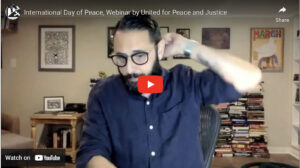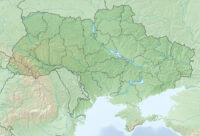The Ukraine crisis intensifies, with no clear path to resolution. A military confrontation between the United States and Russia, the world’s most heavily armed nuclear nations, could spell disaster.
It is time for the people of the world to cry Enough! No more war threats, no more War! The peace movement must be a global people’s movement, aligned with the policies of no government.
The governments of the United States and its allies bear responsibility for refusing to include the post-Soviet Russian government in security arrangements that would allow it to feel secure within its borders. After the Cold War, Russia’s government sought a European security order in which it could be a full participant. Russia also relied on assurances from the United States government and its allies that NATO would not be expanded to the East.
Instead, the government of the U.S. and its NATO allies pursued a far more confrontational course, expanding NATO to include former Soviet republics and Warsaw Pact countries, and leaving open the possibility of membership for Georgia and Ukraine, moves which would extend the alliance right up to Russia’s borders. It was against this background that the 2014 overthrow of Ukraine’s government occurred, leaving Russia with a government backed by Western powers on its doorstep. Followed swiftly by Russia’s occupation of Crimea and the revolt of two regions in Ukraine’s East, the crisis devolved into a complex proxy war in the breakaway regions, with forces supported by Russia facing a Ukraine military receiving varying degrees of support from the government of the United States and its NATO allies.
The people of Ukraine have borne the brunt of all this. In eight years of fighting, 14,000 Ukrainian soldiers and noncombatants have been killed, and over 1.5 million displaced. Russia also likely has suffered combat casualties in Ukraine, although the numbers are unknown. The society and infrastructure of Ukraine’s East have been badly damaged by eight years of fighting.
And now the people of Ukraine find themselves at the center of a renewed and broader crisis, one that could draw the militaries of the United States, its NATO allies and Russia into direct conflict. The Russian government has deployed a significant part of its land forces towards Ukraine’s borders. At the same time it is making demands for a sweeping renegotiation of Europe’s security arrangements, including a significant rollback of NATO. The United States and NATO have for the most part rejected those demands, offering instead negotiations on a narrower range of arms control and confidence-building measures, and refusing to place any limits on further NATO expansion.
The United States government and some of its NATO partners are increasing weapons shipments to Ukraine. The U.S. also is placing military forces on alert for rapid deployment to Europe. Russia, the United States, and NATO all are conducting significant naval exercises in the waters in and around Europe. It must be emphasized that Russia and the United States together hold over 90% of the world’s nuclear weapons, and a wider war in Europe could involve four out of the original five nuclear-armed states.
All of the governments make much of their “sovereign” rights to deploy their militaries however they wish within their borders or in international waters, and to make alliances and send weapons and military forces to any allied country that will accept them. That does not mean that every alliance is wise, or that a government can deploy its forces at will in ways that an adversary is likely to understand as a threat. The United Nations Charter, a treaty to which all the antagonists here are a party, prohibits member states from “the threat or use of force against the territorial integrity or political independence of any state….” (Article 2, sec.4) It also requires members to “settle their international disputes by peaceful means in such a manner that international peace and security and justice, are not endangered.” (Article 2, Sec. 3). Further introduction of more weapons and forces, overt or covert, into or around Ukraine and its disputed regions by any party only increases the likelihood of a war that careens out of control.
All military forces of all nations must stand down, and their governments must stop insisting that this crisis is necessary. It is up to the peoples of each of the antagonists to demand this of their governments.
Here in the United States, what we must demand of our government, in the hope that the people of all countries involved on all sides of this deepening crisis will make similar demands on theirs:
Immediately:
–We call on the government of the United States to be willing to negotiate with any and all states without conditions. Its “security” policies have played a significant role in bringing Europe, and the world, to the brink of disaster.
–The people of the Ukraine are on the front lines of the ongoing war and most at risk should it intensify. We call on the government of the United States to use all diplomatic means to encourage an immediate cease fire, a pullback of military forces from the conflict zones, and negotiations aimed at giving Ukraine’s people a real voice in their future, free of coercion from armed formations of all kinds, whether state militaries or regional militias. The United States should also provide humanitarian assistance to be directed to ordinary people in all of Ukraine’s regions, sustaining social benefits and public services and aiding in reconstruction of housing and public infrastructure damaged by war.
–We call for an immediate cessation of shipments of weapons or other military aid to Ukraine, and of the introduction of additional U.S. military forces and equipment of any nature into Europe.
–We call for an immediate, and world-wide, moratorium on U.S. military exercises outside the borders of the United States, and especially of provocative exercises, tests, and deployment of nuclear-capable forces.
–We call for a halt to the rush to additional sanctions against Russia, its government, or its economy. Ill-considered sanctions are more likely to impair than enhance good faith negotiations.
–We call for a moratorium on expansion of NATO.
And then we call for:
— Reversal of NATO decisions to expand rapid reaction forces and supporting infrastructure in Eastern Europe.
–Termination of U.S. programs to deploy U.S. ballistic missile defenses in Europe.
–Removal of U.S. nuclear weapons from Europe.
–More than three quarters of a century after the U.S. atomic bombings of Hiroshima and Nagasaki and more than half a century after the United States, Russia, and the United Kingdom committed in the Nuclear Nonproliferation Treaty to negotiate in good faith for an end of the nuclear arms race and the elimination of nuclear arsenals, immediate commencement of negotiations encompassing all nuclear-armed states for the elimination of nuclear weapons.
–Commencement of broader negotiations towards peaceful, inclusive security arrangements for Europe in which the NATO military alliance, its roots deep in the Cold War, will no longer be seen as needed by any of Europe’s people, allowing all U.S. forces in Europe, after more than three quarters of a century, to finally come home.
The most powerful countries have been in a permanent state of mobilization for war for over 80 years. We have lived under the threat of nuclear war for three quarters of a century. It is time to bring all the troops home, to bring us all home from the war.
The United for Peace and Justice Coordinating Committee


